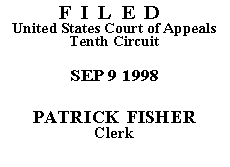

| UNITED STATES OF AMERICA,
Plaintiff-Appellee, v. PATRICK J. McGRAW, a/k/a P.J. McGRAW, Defendant-Appellant. |
|
Defendant Patrick J. McGraw operated an adult entertainment club called Shadows in Kansas City, Kansas. He also owned Shadows' parent corporation, McGoo's. During an investigation of defendant, the government estimated defendant's corporate income by reviewing invoices from liquor distributors and estimating the number of drinks per bottle and price per drink. In 1994, defendant and the government entered into a plea agreement under which defendant agreed to waive indictment and plead guilty to one count of tax evasion for the tax year ending March 31, 1993, based on an understatement of corporate income. The agreement specified, in part, that defendant would file amended corporate tax returns for prior years, pay additional tax, and assist the government in its investigation of others. The agreement specified that the government would recommend a sentence of probation, but if the district court did not accept that recommendation, defendant would be allowed to withdraw his guilty plea and the government would be allowed to "seek an indictment on the instant charge and any other additional charges it so desires." Appellee's Suppl. App. at 5. The district court did not accept the recommended sentence. Defendant withdrew his guilty plea, but paid additional tax and filed amended tax returns for the specified years. The information was dismissed.
In 1997, defendant was indicted for filing false tax returns for the same tax years for which he filed amended returns. He filed a motion to dismiss the indictment, arguing that the 1994 plea agreement estopped the government from proceeding with the 1997 prosecution. He also argued that the government violated Fed. R. Crim. P. 11(e)(6) by using statements made during the 1994 plea negotiations in forming the 1997 indictment. The district court denied the motion to dismiss. Defendant then entered a plea of guilty conditioned on bringing this appeal. See Fed. R. Crim. P. 11(a)(2). The district court sentenced him to eight months' incarceration and a $10,000 fine. We have jurisdiction under 28 U.S.C. § 1291.
Whether the government has violated a plea agreement is a question of law which we review de novo. See United States v. Cooper, 70 F.3d 563, 565 (10th Cir. 1995). Plea agreements are governed by contract principles. See id. When defendant withdrew his guilty plea, he rescinded the plea agreement and it ceased to bind him or the government. Cf. Santobello v. New York, 404 U.S. 257, 269 (1971) (stating that "when a plea rests in any significant degree on a promise or agreement of the prosecutor, so that it can be said to be part of the inducement or consideration, such promise must be fulfilled"); United States v. Brye, 146 F.3d 1207, 1210 (10th Cir. 1998) (holding that appeals court examines "the nature of the government's promise" in plea agreement and "defendant's reasonable understanding . . . [when] the guilty plea was entered"). The cases defendant cites as authority for his position are inapposite because they are all premised on a guilty plea actually being entered. Moreover, the agreement in this case warned defendant that if he should withdraw his plea, the government would be free to pursue indictment on any matter. Defendant has not shown that the government relied on any statements made by him during plea negotiations in forming the basis for the 1997 indictment.
The judgment of the United States District Court for the District of Kansas is AFFIRMED.
Entered for the Court
Circuit Judge
*. This order and judgment is not binding precedent, except under the doctrines of law of the case, res judicata, and collateral estoppel. The court generally disfavors the citation of orders and judgments; nevertheless, an order and judgment may be cited under the terms and conditions of 10th Cir. R. 36.3.